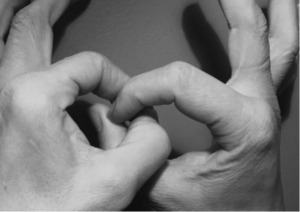I spend most of my work-life helping leaders find better ways to thrive personally and professionally, as well as to guide others in doing the same. Today I’m asking myself, What does self-worth have to do with leadership?
My simple answer? Everything. If you want to lead in a way that uplifts people, encourages vitality and growth, and motivates repeated high performance, self-worth is key.
One of my mentors, an epidemiologist named Mark, taught me an important lesson about self-worth and leadership decades ago. I’d stepped into my first management role at a global information technology company, a newbie with an overabundance of drive and a passion to “do good” but very little real world experience.
First Mark asked me to create two circles out of the thumb and index finger on each of my hands. Then he told me to interlink those circles. (Give this a try!) “One circle represents self-worth, and the other circle represents performance,” he claimed.
“Imagine performance going up – you over-achieve your goals, a customer recognizes your team for outstanding work, you knock your sales quota out of the ballpark. For most of us, self-worth – our deep sense of value as a person – goes up as well. When we perform better, we feel better about ourselves. This is natural, and it’s ok … at least on the surface. But what occurs when performance goes down?” (And we all know eventually it will.) “Does that mean you’re unworthy or less valuable as a human being?”
Mark explained the most essential leadership role I could play was to help people decouple these two circles, reinforcing a profound message we likely all need to hear: you are worthy by the very fact that you exist no matter what happens with your performance.
Too frequently, we use titles, skills, goals achieved, weight, image, (fill-in-the-blank-for-you), and other outer appearances as attempts to know ourselves. No surprise that our self-worth goes up and down then; it’s riding the roller coaster of our accomplishments (or lack thereof). Big mistake. We’re left feeling unmoored and insecure, prey to whatever change is next. As the best and worst of our life experiences define us we forget: who we are at our essence is not what we do. Every human being is greater than any way they are objectified or described.
When I applied Mark’s leadership guidance to myself and my teams, over time I noticed people seemed happier, more inspired and engaged at work, willing to help out each other and even disagree with greater trust and respect, and more appreciative of the organization and themselves. In my newbie-leader brain, a light bulb had switched on: Mark had opened up within me an unconventional pathway to facilitate a thriving team, one that emanated from within team members themselves.
Years later, I’m confident: When you help people (including yourself!) untether self-worth from externals such as performance, at the very least these three things will follow:
- Energy is freed up for innovation and change. We’re not our achievements and roles (or challenges, judgments, and pains). When we realize this, it’s nothing short of transformative. The energy that was once stuck in misguided notions we held about ourselves is now liberated, available as an amazing creative resource for bettering our organizations and our lives.
- Learning accelerates. Without identifying so tightly with titles, performance, and other outside measures, we give ourselves more room to make mistakes and learn. New York City-based psychotherapist, Mark Sehl says, “The path to learning has to be strewn with mistakes. Accepting that frees one from the shackles of perfection.”
- Healthier relationships are forged. Human beings are hard-wired for connection. We bond with one another for all kinds of reasons. If we want collaborations built on mutual trust and gain, it means bringing our whole, worthy selves, rather than our insecurities, to the relationship.
Gautama Buddha is often quoted as saying, “You yourself, as much as anybody in the universe, deserve your love and affection.” When you assist people in getting in touch with an authentic path of self-value independent of the sways of the world outside, it unleashes human energy for inspiration and creativity, vibrant connections, exceptional performance, aliveness and joy … qualities sorely needed in our workplaces and our world.
What does self-worth have to do with leadership? Everything!
READ MORE
- What Path Is Worthy Of YOU This Year?
- Listening Your Way To Great Leadership
- Leading From Authenticity: Boosting Your Energy, Impact, and Wellbeing
- Wellbeing Leadership: Where Are YOU On This Journey?
Photo Source: David Moorefield







What a powerful image and lesson. Thank you for sharing Renee!!
You are so welcome, Mia!